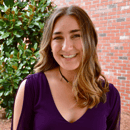As a senior in college, many of us have some general idea of what we want to do, but nothing concrete. For Ella, however, she knew what she wanted to do and took action to get there. She combined two of her passions and formed them into her own line of work: a gender-responsive, female-empowerment program at the Guilford County Detention Center (GCDC), where she implements it once a week. She leads it entirely by herself, with occasional feedback from her old supervisor from an internship at the GCDC and a few faculty members at Elon.
So when did your idea to do a gender-responsive program first form?
Starting my sophomore year, I’ve sort of always known I’ve wanted to work in the world of juvenile justice reform, and specifically working with female juveniles because female empowerment is something that I’m really passionate about. Starting my sophomore year I started to develop the curriculum for a female empowerment group that could be implemented inside of a detention center. So I just started calling every detention center within a 100-mile radius – I was willing to go wherever, do anything, to just get my foot in the door. I was so motivated. And my ignorant sophomore self thought that I could just call these places and they would just be like, “Yeah, sophomore-in-college! Come implement your curriculum!” I don’t know what I thought, but I thought I had the authority to just call up the director of programming of prisons and be like, Let me come and do this. They were like, “What are you even proposing?” It was so shambly. And so then I went to go talk with a professor, Sandra Reid and Dr. Beth Warner. I went to both of them and I was like, I have this idea, I know I want to do this, so help.
How did you know them at the time?
I had Dr. Allocco second semester of my sophomore year and I told her about my idea because she terrified me and I was like, I think I should talk to this woman about this idea. So I went to her and she was like, You should meet with Dr. Beth Warner…So I met with her and she referred me to Sandra Reid. Sandra has years of experience in the juvenile justice system working as a court counselor. So long story short, I met with Sandra, I met with Dr. Warner, and they both gave me some good feedback and were both like, “You can’t go do this right now. That would be super problematic. You need to develop this a lot more.” And I was like, Yep, thank you. It was hard to hear but I also needed to hear it because the program was nowhere near where it needed to be.
What did you have at that point?
Pretty much just an outline. Literally just a two-page document of, this would be evidence based, I think this would be a good idea, this is being done in Seattle and I think it should be done here. Just different ideas, but just so scatterbrain with no actual structure for a program.
How did you initially get the program off the ground?
My second semester my junior year I got the email saying that I had to pick my practicum location for my HSS major – so as a major you have to do both a practicum and an internship. And I knew that I wanted to do both at the department of Juvenile Justice in Graham. So I emailed the chief court counselor and I was like, “Hey, I want to do my internship,” and didn’t hear from her for a month. I had to jump through all these hoops to get this internship. So eventually I get there, I start my practicum, and day one I went up to my supervisor and was like, “I’ve been developing this program for two years now, I really want to implement it in the fall. Who do I need to talk to?” And he helped me navigate proposing it to all the right people, the right government officials and whatnot. By that point I had a really good working definition of what the group would look like, of what we were going to do. So I proposed it to all these people over the summer, and then at the beginning of my internship semester in the fall, I was able to start the group on Tuesdays with girls on probation and then on Thursdays I would go to the GCDC and facilitate the group there for an hour.
What does the actual program look like?
The GCDC is both boys and girls, so I go into an all-female pod. It’s a locked facility and a jail, so it’s not a prison. So the population is rotating through. There’s only one girl that’s consistently there every week. We do the hour-long session, and instead of building because you can’t build when it’s new people every week, we introduce a baseline level of rapport at the beginning of every session and then do some sort of activity, whether it’s an artistic activity or just a conversation-based activity, or some sort of activity surrounding a theme. So whether that theme is defining good values, or what it means to be an adolescent female and love being female. We talk about sexuality a lot, because none of the girls that I’ve worked with purely identify as straight which is super interesting…So we talk about sexuality a lot, about femininity, about just being an adolescent is a huge thing. Like what does it mean to be vulnerable to your friends? Loyalty is a huge theme that we talk about all the time because they all have deep-seated trust issues and they’re all really nervous to open up.
Do you feel like you’re really making an impact on the girls who come to your group?
I do feel like it’s making a difference on the girls’ lives because of two moments that happened last semester. It was my last session with the girls before I left for winter break. I told them a week before, just so you guys know next week will be our last session for a while. And I had only had, last semester, two reoccuring people and then everyone else was just rotating through…When I had told one of them that – well, this girl is a wall. Like not emotional – I had no idea if I was reaching her, no idea. And I told her that and she was like, “Aw man, I’m so upset! I’ve really enjoyed this. You’re so nice.” She was just saying really kind things, and I was like, what? I was so confused, I got into my car and cried. And so the last session came and she was like, “I’m gonna miss you, Miss Ella.” And now I’m with her again because she’s one of the consistent people who’s just still awaiting her trial. So I do feel like, at the least, I’m providing them with an hour of safe space a week and a compassionate face, a listening ear. A good snack. Little things that they care about. Part of my authority is that I’m not a therapist, and they all have really negative perceptions of therapy and of therapists. So they like me because at the beginning of every session I present myself as a college student. I’m like, My name is Ella, I’m a senior in college, I am not a therapist, I am not this authority figure coming in here telling you what to do because that is just a bad idea with them. But that’s how all the programming is. So part of my authority is that I’m not who I should be, and they like that.
Is there anything you struggle with when it comes to your program?
The one thing that I really struggle with, even just sitting here talking with you about this, is imposter syndrome. What I mean by that is that I definitely don’t have the authority to be doing the work that I’m doing right now. I’m not a licensed social worker, I’m not a licensed therapist. Currently in North Carolina, there are two gender-responsive programmings that are happening outside of prisons and there are none happening inside of juvenile prisons. So I’m more passionate about filling this gap than I am about worrying about how I’m being an imposter by being in these spaces, by not having the licensure to be doing this work, so I spend a lot of time questioning and feeling really anxious about, am I the right person to be doing this work? Should I be doing this work?


